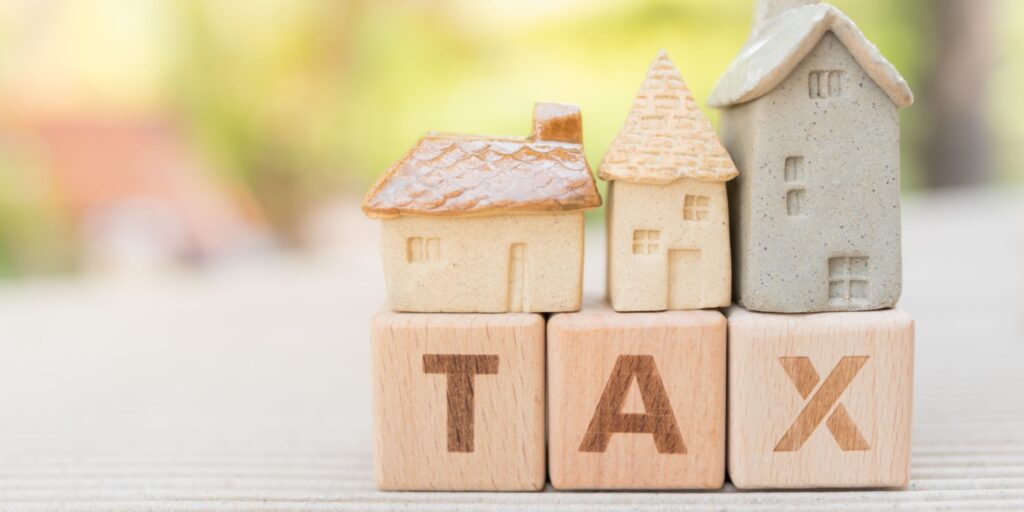Investing in residential property is often seen as an appealing option due to its long-term growth potential, with property values and rental yields in most parts of the UK showing appreciation over time. However, when buying or letting UK property as a non-resident landlord, it’s important to understand the tax implications and reporting requirements you’ll face.
In this post, we explain what tax you may have to pay on profits from UK rental income as a non-resident landlord. We discuss HMRC’s Non-resident Landlord Scheme, applying to receive rental income with no tax deducted, and the requirement to file a tax return.
What is a non-resident landlord?
HM Revenue and Customs (HMRC) defines a non-resident landlord as a person who owns property in the UK, receives rental income from it, and whose ‘usual place of abode’ is situated outside the UK. This applies to individuals, companies, trustees, and partnerships.
As an individual, your usual place of abode is outside the UK if you live abroad for at least 6 months per year – even if you are a UK resident for tax purposes.
Typically, a company’s usual place of abode is outside the UK if one of the following applies:
- its main office or other place of business is situated outside the UK
- it was incorporated outside the UK
The usual place of abode is within the UK for the purpose of tax on rental income if:
- a company is regarded as resident in the UK for tax purposes, even though it may be incorporated outside the UK
- a UK branch of a non-resident company must pay Corporation Tax
A trust is considered to be outside the UK if all of its trustees live abroad. However, if at least one of the trustees has a usual place of abode in the UK, the trust is not a non-resident landlord for tax purposes.
What taxes are paid on property in the UK?
In the UK, there are several types of taxes associated with buying, owning, letting, developing, and disposing of property, including:
- Income Tax (and National Insurance contributions if you’re a UK resident for tax purposes)
- Corporation Tax
- Stamp Duty Land Tax (or the equivalents in Scotland and Wales)
- Capital Gains Tax
- Annual Tax on Enveloped Dwellings
These taxes apply regardless of where the property owner lives. Therefore, as a non-resident landlord, you are liable to pay tax in the UK on any profit you make from letting (renting out) UK-based property. This applies even if you are a tax resident in another country and reporting your UK-derived rental income abroad.
You must register with HMRC as a non-resident landlord and pay tax on rental income through the Non-resident Landlord Scheme or Self Assessment. We explain these options below.
Paying tax through the Non-resident Landlord Scheme
The Non-resident Landlord Scheme (NRLS) is an HMRC scheme that taxes non-resident landlords on their UK rental income before they receive it. Under this arrangement, the landlord’s letting agent or tenant must:
- deduct the basic rate of Income Tax (20%) from the rent (after the deduction of any expenses they have paid)
- pay the tax directly to HMRC every three months
- provide the landlord with a certificate at the end of the tax year saying how much tax they’ve deducted
The term ‘letting agent’ refers to anyone who manages rental property on behalf of a non-resident landlord – not just traditional letting agents. They must operate this scheme regardless of the amount of the rent they collect. The only exception is when HMRC tells them in writing that the landlord may receive the rental income with no tax deducted.
Where a landlord doesn’t have a letting agent, their tenant must operate the scheme instead. However, if the tenant’s rent is £100 a week or less, they don’t have to use the NRLS unless HMRC tells them to do so.
To operate the Non-resident Landlord Scheme, your letting agent or tenant must:
- register for the scheme
- submit a quarterly return and tax payment to HMRC
- submit an annual return and tax payment to HMRC
- provide you with a certificate
- keep records as evidence of compliance
GOV.UK provides detailed guidance online for letting agents and tenants operating the Non-resident Landlord Scheme. This includes information on how they can register.
Paying tax through Self Assessement
If you want to manage your own landlord tax obligations and receive rental income in full with no tax deducted, you must obtain approval from HMRC. Under this arrangement, you pay tax on profits through Self Assessment rather than the NRLS.
To apply, you need to complete form NRL1i. You can do this using HMRC’s online service, or you fill in the form on-screen, print a copy and sign it, and then post it to HMRC. If your UK rental property has more than one owner, each person must complete an application for their share of the rental income.
The following details must be provided on the form:
- Name and date of birth
- Address, phone number, and email address
- UK National Insurance number, if you have one
- Unique Taxpayer Reference (UTR) number, if you have one
- Details of the agent authorised to communicate with HMRC for you (e.g. an accountant), if applicable
- Address of UK rental property
- Details of your letting agent or tenant
- The date you started (or expect) to receive rental income for this property
- Whether you receive other income from the UK (e.g. from employment, pensions, profits from stocks and shares)
If you need to authorise an agent to communicate with HMRC on your behalf, you must use the postal version of form NRL1i. You’ll also need to complete the 64-8 Agent Authorisation form and post it with your application.
After submitting an application
HMRC will grant approval and register you for Self Assessment if you satisfy the following conditions:
- your UK tax affairs are up to date, or you’ve never had any UK tax obligations
- you don’t expect to be liable to UK tax for the tax year in which you make the application
Your letting agent or tenant will then be instructed by HMRC not to deduct tax from your rent. This means that you’ll receive the gross amount of rent due to you. However, this doesn’t mean that the rent is exempt from UK Income Tax. You still need to declare and pay tax on your rental income through Self Assessment.
The rates of Income Tax payable on your rental profits will depend on your total UK-derived income from all sources and whether you’re entitled to any tax allowances.
Filing a Self-Assessment tax return
Whether you register with HMRC through the Non-resident Landlord Scheme or receive rent with no tax deducted, you must declare your rental income in an annual Self Assessment tax return (form SA100) if it is:
- between £2,500 to £9,999 after allowable expenses
- £10,000 or more before allowable expenses
The first £1,000 of your rental income in the year is tax-free. This is known as your ‘property allowance’. If your rental income is between £1,000 and £2,500 a year, you need to contact HM Revenue and Customs (HMRC).
As a non-resident landlord, you must complete the following supplementary sections of the tax return:
- the ‘Residence, remittance basis etc’ section (form SA109) – to record your residence and domicile status
- the ‘UK property’ section (form SA105) – to record your UK property income
If you’ve had tax deducted from rental income through the Non-resident Landlord Scheme, you can report this in the UK property section of the return.
If you don’t normally send a Self Assessment tax return, you must register for Self Assessment by 5 October following the tax year in which you received the rental income. You can register online.
Where you’re also subject to tax on UK rental income in your country of residence, you may be able to claim relief or a refund under a ‘double tax agreement’.
Claiming tax refunds and personal allowances
You can ask HMRC for a tax refund if both of the following apply:
- your rental income is lower than your annual Personal Allowance
- your letting agent or tenant has already deducted basic rate tax from the rent
Under the provisions of a double tax agreement, some non-resident individuals are eligible for UK tax allowances. This includes the annual Personal Allowance of £12,570. Check section INTM334580 of HMRC’s International Manual to find out if this applies to you.
To request a refund or claim personal allowances, you need to complete form R43 and send it to HMRC. Any amount of tax already deducted through the NRLS will be taken into account when calculating what you owe or are owed through Self Assessment.
Non-resident landlord companies and trusts
If you own UK rental property through a non-resident company (rather than as an individual), the company will be liable to UK Corporation Tax on any profit it makes from rental income.
You can pay this tax through the Non-Resident Landlord Scheme. Your letting agent or tenant will deduct the tax from the rent before paying you. Alternatively, if your company is resident in the UK for tax purposes, you can apply to HMRC to receive UK rental income without any deduction of UK tax.
To apply to receive rent in full, you must complete form NRL2i. If the non-resident landlord is a trust, you need to use form NRL3i.
- An introduction to Corporation Tax
- Do I need to file a Company Tax Return?
- How to avoid double taxation of company profits
You will need to complete a Company Tax Return (form CT100) or a Self Assessment Trust and Estate Tax Return (SA900) for HMRC after the end of each tax year. You will then pay any tax due on your profits. However, this requirement may not apply if you have tax deducted under the Non-resident Landlord Scheme.
Read HMRC’s guidance on paying Corporation Tax if you’re a non-resident company landlord. This explains your obligations if you have opted to receive rental income in full without any tax deduction.
If your company or trust is also subject to tax on UK rental income in its country of incorporation or residence, you may be able to claim credit under a double tax agreement for the UK tax already paid. This would allow you to avoid being taxed twice on the same income.
Stamp Duty Land Tax (SDLT) when buying UK property
Stamp Duty Land Tax is usually payable on UK property transactions over a certain price. In Scotland and Wales, this tax is known as Land and Buildings Transactions Tax (LBTT) and Land Transaction Tax, respectively.
Non-UK resident buyers are subject to the same rates as UK residents. However, you may have to pay additional surcharges if you’re not a UK resident for the purposes of SDLT.
There are different rules and rate calculations for corporate bodies, including companies and trusts, buying residential properties in the UK.
Annual Tax on Enveloped Dwellings (ATED)
Annual Tax on Enveloped Dwellings is an annual property tax payable mainly by companies owning UK residential property worth more than £500,000.
If you own UK property through a non-resident company, you may need to complete an ATED return for HMRC and pay tax each year.
Capital Gains Tax (CGT) on the disposal of UK property
When selling or disposing of UK residential property, you may have to pay Capital Gains Tax (CGT) if you make a gain (profit).
If you’re an individual non-resident landlord planning to sell or give away all or part of your share of a UK property, you can use HMRC’s non-resident Capital Gains Tax calculator to work out your gain and any tax due.
Be aware that double taxation agreements do not apply to tax on profits from selling UK residential property.
Companies do not pay CGT. If you own UK residential property through a non-resident company, any profit you make when selling or disposing of the property will be subject to Corporation Tax instead. You must report this on a Corporation Tax Return.
Thanks for reading
We hope you’ve found this information useful. Property investment and taxes can be complex, particularly for non-resident landlords. Therefore, we would urge you to seek professional advice from an experienced accountant to help you navigate the property tax rules in the UK.
Please note that the information provided in this article is for general informational purposes only and does not constitute legal, tax, or professional advice. While our aim is that the content is accurate and up to date, it should not be relied upon as a substitute for tailored advice from qualified professionals. We strongly recommend that you seek independent legal and tax advice specific to your circumstances before acting on any information contained in this article. We accept no responsibility or liability for any loss or damage that may result from your reliance on the information provided in this article. Use of the information contained in this article is entirely at your own risk.












Join The Discussion
Comments (2)
Excellent article! It will be helpful to learn these things about UK property taxes for my UK tax advisers business.
Thank you for your high praise, David. We’re so glad you will be able to use what you learnt for your own business.
Kind regards,
The 1st Formations Team